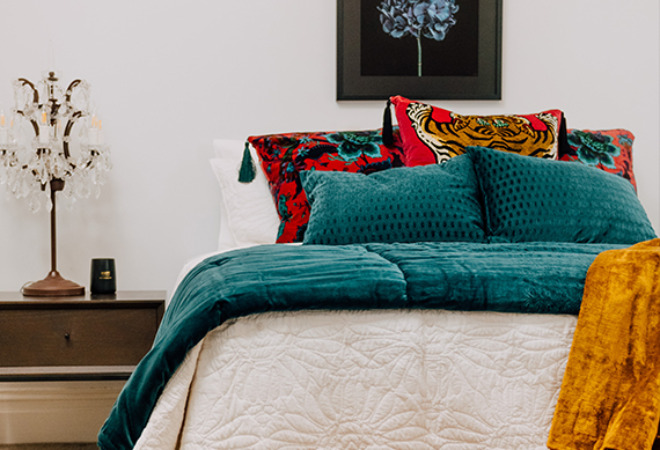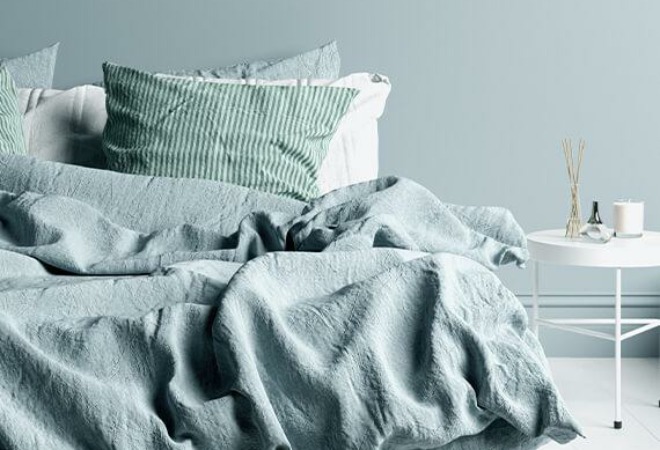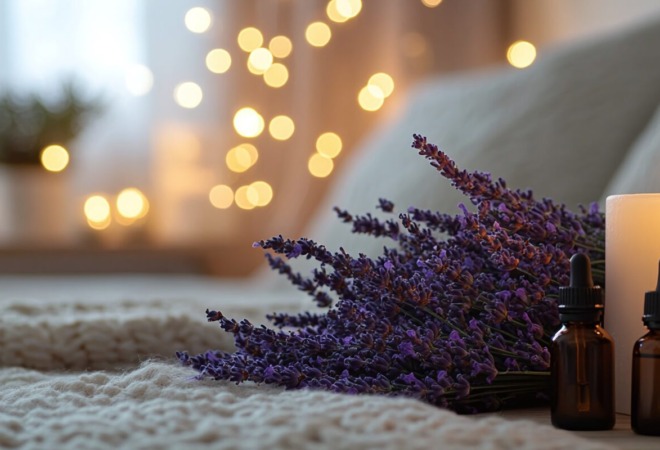Thread count refers to the number of threads per square inch, but more isn’t always better. Ideal thread counts range between 200–600 depending on the material and sleep needs. Percale (200–400) offers a cool and crisp feel, making it great for hot sleepers. Sateen (300–600) provides a silky smooth texture, ideal for those seeking luxury. Consider your sleep temperature, texture preferences, and budget when choosing the best linen for you.
TIPS FROM PAULA WALLACE OF WALLACE COTTON
What linen is right for you?
CONSIDER YOUR FABRIC CHOICE
In any season, natural linen is wonderful for a good night’s sleep. It’s a good choice if you are inclined to heat up when you sleep, to lessen heat-induced restlessness. Pure cotton sheets are crisp and cool and come in a range of finishes and thread counts for all personal preferences. For an ultra-crisp and cool feeling choose a cotton percale such as the Heirloom Sheet Set, or for silky smooth feeling in bed, opt for a high-thread count sateen, such as Monarch Sateen Sheet Set giving you a soft, luxurious feel.
WHAT THREAD COUNT IS RIGHT FOR YOU?
While a high thread count is a good indicator of quality, the type of yarn and weave will also affect the feel of the fabric. Good quality sateen bed linen should have a high thread count with diagonal threads on the surface of the fabric. If you like a soft, silky feeling, choose a lustrous cotton sateen. Percale is a closely woven square-weave fabric with a similar number of vertical and horizontal threads. Percale fabric can be woven up to 500 thread count and has a cooler crisper feeling against your skin.
Let’s find out a little more about thread count …
WHAT IS THREAD COUNT?
So what does thread count mean? Sheet thread count refers to the number of threads (strands of fabric) per square inch of fabric. This is calculated by counting the number of horizontal threads and the number of vertical threads that make up the weave of the fabric. The quality of the actual threads — what they are made from and what type of threads they are — should be the main point of consideration, not just how many there are.
WHAT IS THE BEST THREAD COUNT FOR SHEETS?
It is best to look for sheets with a thread count of around 200-600 for most fabrics. Higher thread counts (800-1000) are often more expensive for little variation in softness. In some cases, the heavier or thicker the fabric, the less breathable it may be.
WHY THREAD COUNT MATTERS (AND WHEN IT DOESN’T)?
Thread count is not necessarily related to the breathability, comfort of softness of fabric. For example, a 400 thread count sheet may be softer and more breathable than a 1000 thread count sheet. Also, a 100% bamboo fibre sheet may be softer than a 100% cotton sheet, even if they are the same thread count, meaning it’s impossible to define their characteristics by the thread count alone. Breathability comes down to what the sheet is made from. A sheet made from cotton is likely to have more breathability than a sheet made from polyester, even if they are the same thread count. There are many factors to consider.
Ideal thread count for comfort and durability
We have a quick reference table for the expected range of high-quality thread counts broken down by fabric type. Note that some materials are not suited to measurement by thread count; instead they are measured in momme (weight) or GSM (grams per square metre).
FABRIC TYPE |
|---|
Silk |
Cotton |
Egyptian cotton |
Linen |
Percale weave |
Bamboo |
Microfibre |
Flannel |
Sateen weave |
IDEAL THREAD COUNT |
|---|
17-22 momme |
200-400 |
300-800 |
50-140 |
200-400 |
300-500 |
90-120 GSM |
160-190 GSM |
300-600 |
BREATHABILITY |
|---|
DURABILITY |
|---|
SEASON |
|---|
All-year round |
All-year round |
All-year round |
Spring, Summer |
Spring, Summer |
Spring, Summer |
Autumn, Winter |
Autumn, Winter |
Autumn, Winter |
FABRIC TYPE | IDEAL THREAD COUNT |
|---|---|
Silk | 17-22 momme |
Cotton | 200-400 |
Egyptian cotton | 300-800 |
Linen | 50-140 |
Percale weave | 200-400 |
Bamboo | 300-500 |
Microfibre | 90-120 GSM |
Flannel | 160-190 GSM |
Sateen weave | 300-600 |
FABRIC TYPE | BREATHABILITY |
|---|---|
Silk | |
Cotton | |
Egyptian cotton | |
Linen | |
Percale weave | |
Bamboo | |
Microfibre | |
Flannel | |
Sateen weave |
FABRIC TYPE | DURABILITY |
|---|---|
Silk | |
Cotton | |
Egyptian cotton | |
Linen | |
Percale weave | |
Bamboo | |
Microfibre | |
Flannel | |
Sateen weave |
FABRIC TYPE | SEASON |
|---|---|
Silk | All-year round |
Cotton | All-year round |
Egyptian cotton | All-year round |
Linen | Spring, Summer |
Percale weave | Spring, Summer |
Bamboo | Spring, Summer |
Microfibre | Autumn, Winter |
Flannel | Autumn, Winter |
Sateen weave | Autumn, Winter |
How to choose the right thread count for you
The best thread count is not always the highest number, especially in the case of linen. The quality of the thread is more important than the number of threads in a fabric, but knowing a general range of thread count may help you to choose the right kind of sheets for your needs.
Understanding your sleeping habits, preferences and budget can help you choose the ideal thread count and material for a great night’s sleep.
HOT SLEEPERS
For those who experience warmer temperatures at night, or sleep hotter in general, the ideal thread count is likely around 200-400. Lower thread counts in this range typically provide increased breathability and moisture-wicking properties. In comparison, higher thread counts are known to trap heat. This means hotter sleepers may wish to choose cotton sheets with a percale weave, which allows improved airflow compared to sateen weaves or microfibre fabrics. Wholly natural fibres are also ideal, such as linen, bamboo and 100% silk, as they are naturally more breathable and may help to regulate the body’s temperature.
LUXURY SLEEPERS
Luxury sleepers may wish to look for a higher thread count in the range of 400-600. Thread counts higher than this (800-1000) tend to be more expensive for very little benefit or only a marginal difference in softness. High thread counts do feel smoother and weightier, contributing to their status as a luxury item, but they can trap warmth as well. If this is your preference, look for sheets known for durability and softness in addition to a high thread count, such as Egyptian cotton.
BUDGET CONSIDERATION
Because of their production methods and general appeal, higher thread count sheets tend to be more expensive than those with a lower thread count. For a balance of comfort and cost, consider sheets with a thread count in the range of 200-400. As the thread count itself is not necessarily a marker of quality, look for durable fabrics that will last longer, such as cotton or linen.
SHOPPING GUIDE
Consider the following three factors when buying new linen: the fabric itself, the workmanship and style, thoughtful design considerations.
FAQs on thread count
Thread count refers to the number of threads or strands per square inch of fabric, counting horizontal and vertical threads. It indicates how tightly woven the fabric is. This number is an approximate indicator of fabric softness, but does not always translate to higher quality.
A high thread count is not always a marker of quality or softness. Thread count is not necessarily related to the breathability, comfort or softness of fabric. For example, a 400 thread count sheet may be softer and more breathable than a 1,000 thread count sheet.
High thread count does not always mean quality. It is more important to consider what your sheets are made of. For example, 100% bamboo fibre is much softer than 100% cotton, even if they are the same thread count.




